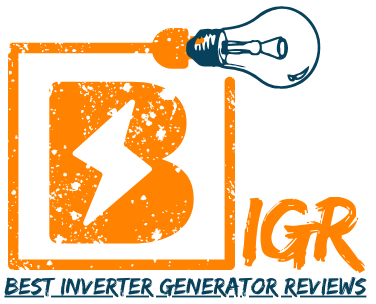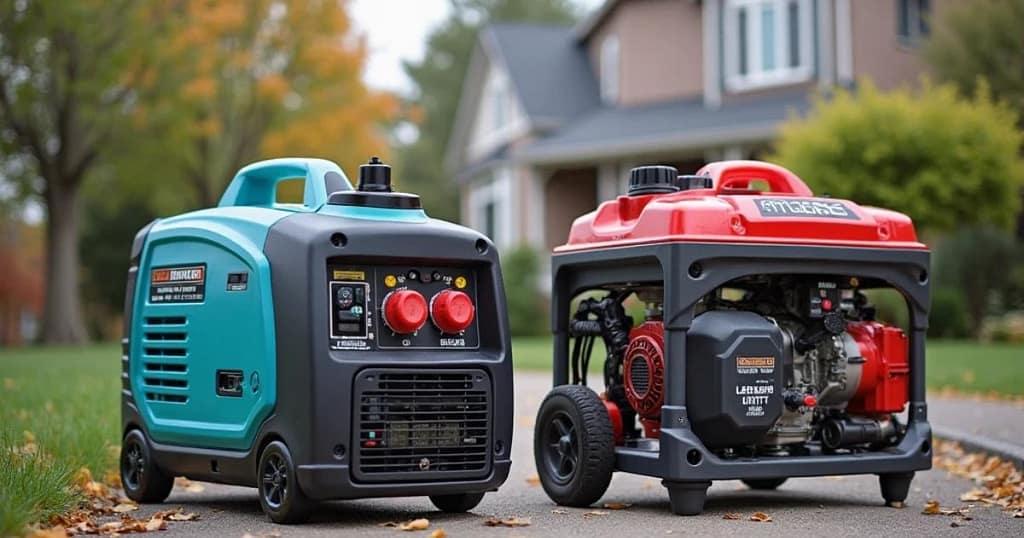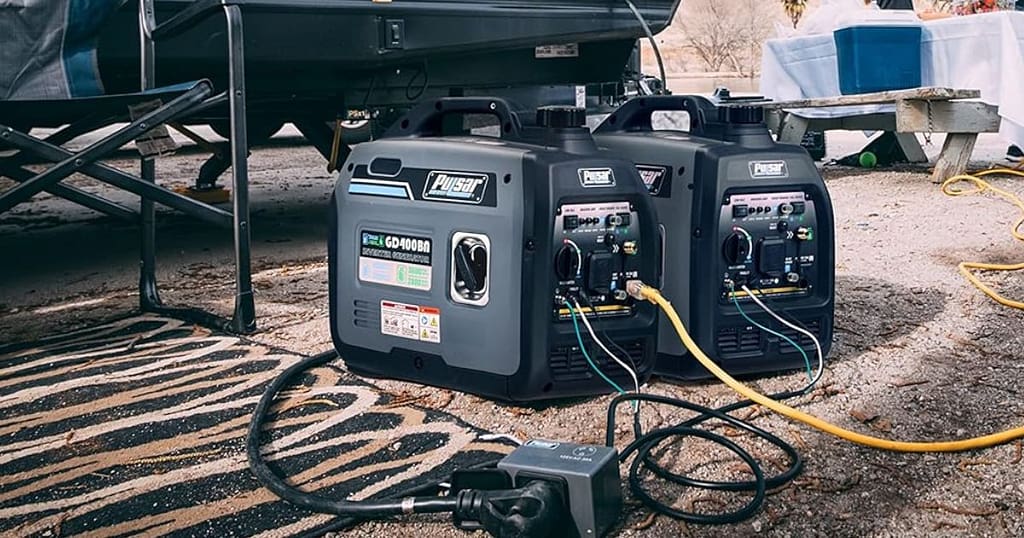If you’re trying to decide between gasoline, propane, or solar for your inverter generator, you’re probably wondering: Which option will save me the most money in the long run? The answer isn’t easy. Each fuel type has different costs, benefits, and ideal uses.
In this easy-to-understand guide, we’ll walk through everything you need to know to make the smartest choice for your situation. We’ll cover:
✔ Actual fuel costs for each type (with real-world examples)
✔ Upfront prices versus long-term savings
✔ Maintenance requirements and hidden expenses
✔ Which fuel works best for camping, home backup, or job sites
✔ How weather and usage affect your costs
By the end, you’ll know exactly which option makes the most financial sense for how you plan to use your generator.
Understanding How Fuel Costs Compare
We’ve done the math carefully to give you accurate comparisons. Here’s exactly how we determined the costs:
- Fuel Prices
- Used 2025 average U.S. prices:
- Gasoline: $3.50 per gallon
- Propane: $3.00 per 20lb tank
- Solar: $0 (sunlight is free!)
- Prices shown reflect nationwide trends, though you might find small differences in your area.
- Used 2025 average U.S. prices:
- Usage Scenario
- We assumed most people will:
- Run about 500 watts at a time (enough for a refrigerator + some lights + phone charging)
- Use the generator for 100 hours per year (that’s about 2 hours per week)
- This is a realistic average for:
- Weekend campers
- Occasional home backup during outages
- Small job site use
- We assumed most people will:
- Generator Lifespan
- Gasoline: Typically 1,500-3,000 hours of use
- Propane: Usually 2,000-4,000 hours (cleaner burning means less engine wear)
- Solar: 5-10+ years (batteries eventually need replacement)
The 5 Key Factors That Determine Your Actual Costs
- Fuel Price Per Hour
- This is what it costs to actually run the generator
- Example: If a gas generator uses 0.25 gallons per hour at
- 3.50/gallon, that′s
- 3.50/gallon, that
- s0.88 per hour
- Upfront Purchase Price
- Gasoline generators are usually cheapest to buy
- Solar generators cost 2-3 times more initially
- Propane models are in the middle
- Maintenance Requirements
- Gasoline needs:
- Regular oil changes
- Fuel stabilizer for storage
- More frequent spark plug changes
- Propane needs:
- Fewer oil changes
- No fuel stabilizer
- Solar needs:
- Almost no maintenance
- Just occasional cleaning of solar panels
- Gasoline needs:
- Fuel Storage Life
- Gasoline goes bad in 3-6 months unless treated
- Propane lasts indefinitely in proper tanks
- Solar doesn’t need fuel storage at all
- Power Output
- Gasoline provides the most power for heavy tools
- Propane gives about 10% less power than gas
- Solar is limited by battery capacity
Gasoline Generators: Pros, Cons & Real Costs
We’ll examine every aspect of gasoline-powered inverter generators to help you make an informed decision.
Why Gasoline Generators Remain the Top Choice
1. Unmatched Power for Demanding Applications
Gasoline generators deliver the highest power output relative to their size. When you invest in a well-built 2000W gas inverter generator, you’ll have sufficient power for:
- Power tools (circular saws, air compressors)
- Kitchen appliances (microwaves, coffee makers)
- Multiple household devices simultaneously
The instant power availability makes them ideal when you need:
- Immediate electricity during outages
- Reliable power for job sites
- Strong performance in cold weather
2. Universal Fuel Availability
Unlike other fuel types:
- Every gas station across the country sells gasoline
- No special containers or adapters needed
- Easy to transport in standard gas cans
- Quick refueling takes just minutes
Because fuel is so readily available, gas-powered models become especially useful for:
- Emergency preparedness
- Remote work locations
- Cross-country RV trips
3. Lower Initial Investment
Compared to other options:
- Entry-level models start around $500
- Mid-range units (
- 800−
- 800−1,200) offer excellent value
- Even premium brands cost less than comparable solar systems
The Challenges of Gasoline Generators
1. Fuel Degradation Issues
Modern ethanol-blended gasoline:
- Begins breaking down after 30 days
- Can clog carburetors in as little as 3 months
- Requires fuel stabilizers for storage
Proper Fuel Maintenance:
- Use ethanol-free gas when possible
- Add fuel stabilizer for storage >1 month
- Drain carburetor for long-term storage
- Rotate fuel supply every 6 months
2. Regular Maintenance Requirements
Typical maintenance schedule:
- Oil changes: Every 50-100 hours of use
- Air filter: Clean every 25 hours, replace annually
- Spark plug: Replace every 300 hours
- Fuel filter: Inspect annually
Annual Maintenance Costs:
| Item | Frequency | Cost |
| Oil change | 2x/year | $20 |
| Fuel stabilizer | Yearly | $10 |
| Air filter | Yearly | $15 |
| Spark plug | Every 2 years | $10 |
| Total | $40/year |
3. Operational Considerations
- Fuel spills and fumes require careful handling
- Noisy operation compared to solar (but quieter than conventional generators)
- Not ideal for indoor use due to emissions
Detailed Cost Analysis
Let’s examine the true operating costs of a popular 2000W gasoline inverter generator:
Fuel Consumption Rates
| Load Level | Wattage | Fuel Use | Cost/Hour* |
| Light | 500W | 0.25 gal | $0.88 |
| Medium | 1000W | 0.40 gal | $1.40 |
| Heavy | 2000W | 0.75 gal | $2.63 |
*Based on $3.50/gallon gasoline
Annual Operating Costs (100 hours)
| Usage Pattern | Yearly Fuel Cost | Maintenance | Total |
| Occasional (25% load) | $88 | $40 | $128 |
| Regular (50% load) | $140 | $40 | $180 |
| Heavy (75% load) | $197 | $40 | $237 |
5-Year Cost Projection
| Cost Factor | Total |
| Purchase Price | $1,000 |
| Fuel (medium use) | $700 |
| Maintenance | $200 |
| Total | $1,900 |
Propane Generators: When They Save You Money
- Propane never goes bad when stored properly
- No need for fuel stabilizers or additives
- Can be stored for years without losing potency
- Ideal for emergency preparedness kits
Real-World Example: Many preppers choose propane generators specifically because they can store fuel indefinitely without maintenance.
Cleaner Operation and Reduced Maintenance
Propane burns cleaner than gasoline, resulting in:
- Less engine wear over time
- Fewer oil changes (extended intervals)
- No carburetor issues (common with gasoline)
- Cleaner spark plugs that last longer
Maintenance Comparison:
| Service | Gasoline | Propane |
| Oil Changes | Every 50 hrs | Every 100 hrs |
| Carburetor Cleaning | Annual | Never Needed |
| Spark Plug Replacement | Every 300 hrs | Every 500 hrs |
Enhanced Safety Features
Propane offers several safety advantages:
- No spills (sealed tank system)
- Lower flammability than gasoline
- Automatic shutoff valves on tanks
- No fuel odors in storage areas
- Can be used indoors with proper ventilation (unlike gasoline)
Understanding the Limitations
1. Reduced Power Output
Important considerations:
- Expect 10-15% less power than gasoline equivalent
- Performance drops in cold weather (below freezing)
- May struggle with high-starting-wattage appliances
Power Comparison (2500W Generator):
| Fuel Type | Rated Watts | Starting Watts |
| Gasoline | 2500W | 3000W |
| Propane | 2250W | 2700W |
2. Fuel Tank Logistics
Practical challenges include:
- Standard 20lb tanks weigh 37lbs when full
- Need to monitor fuel levels (no gauge on most tanks)
- Tank exchange programs can be inconvenient
- Requires proper storage (can’t keep in direct sunlight)
Tank Usage Estimates:
| Load | Runtime per 20lb Tank |
| 500W | 50 hours |
| 1000W | 30 hours |
| 2000W | 16 hours |
3. Availability Considerations
While propane is widely available:
- Not as ubiquitous as gasoline stations
- Exchange tanks often contain less than 20lbs
- Refill stations may have limited hours
- RV parks typically charge premium prices
Detailed Cost Analysis
Fuel Consumption and Costs
Using a 2500W dual-fuel generator:
| Load Level | Propane Used | Cost/Hour* | Annual Cost (100 hrs) |
| Light (500W) | 0.40 lbs | $0.60 | $60 |
| Medium (1000W) | 0.65 lbs | $0.98 | $98 |
| Heavy (2000W) | 1.20 lbs | $1.80 | $180 |
*Based on $3.00 per 20lb tank (current national average)
Maintenance Costs
| Service | Frequency | Cost |
| Oil Change | Yearly | $20 |
| Hose Inspection | Yearly | $10 |
| Spark Plug | Every 3 years | $15 |
| Total Annual Cost | $30 |
5-Year Ownership Costs
| Expense | Cost |
| Generator Purchase | $900 |
| Fuel (Medium Use) | $490 |
| Maintenance | $150 |
| Total | $1,540 |
Solar Generators: Are They Worth the High Price?
Solar generators offer a clean, quiet way to power your devices without using gas or propane. But are they right for you? Let’s understand in simple terms.
How Solar Generators Work
Instead of burning fuel like gas generators, solar generators use free energy from the sun. Here’s how:
- Solar panels collect sunlight
- The energy gets stored in a battery
- An inverter changes the power to run your devices
The main parts are the solar panels (usually 100W-400W), a lithium battery (500Wh-3000Wh), and the inverter that gives you normal household power.
The Good Stuff About Solar Generators
Free Power from the Sun
Once you buy the system, sunlight costs nothing. No more buying gas or propane, which can save you $100 or more each year. This makes them great for off-grid cabins or remote locations.
Super Quiet
Unlike loud gas generators, solar generators make no noise at all. Perfect for:
- Camping without disturbing nature
- RV parks where noise rules are strict
- Backyard use when you want peace and quiet
Good for the Environment
No smelly fumes or risk of fuel spills. If you care about reducing pollution, this is the cleanest option.
Easy to Maintain
There are no oil changes, spark plugs, or carburetors to worry about. Just wipe off the solar panels occasionally, and the batteries last 5-10 years before needing replacement.
The Not-So-Good Parts
Expensive to Buy
Good solar generators cost
1,500−
1,500−3,000, which is 2-3 times more than gas models. You’re paying upfront to save on fuel later.
Need Sunlight to Work
Cloudy or rainy days mean slower charging. In winter when days are shorter, you get less power. They’re not the best choice if you need reliable backup during stormy weather.
Can’t Handle Big Power Tools
Most can’t run heavy equipment like air compressors or table saws. The battery drains fast if you try to power too much at once. These generators work perfectly for powering essential electronics like lighting, mobile devices, computers, and compact kitchen appliances.
What They Really Cost
Let’s compare a $2,500 solar generator to a gas/propane one:
- First Cost: Solar
- 2,500vsGas
- 2,500vsGas600-$1,200
- Yearly Fuel: Solar
- 0vsGas
- 0vsGas60-$140
- Maintenance: Solar
- 5vsGas
- 5vsGas30
- Battery Replacement: Solar
- 500−
- 500−1,000 after 5-10 years
The math: Solar costs more at first but saves on fuel. Our calculations show most users reach cost parity with gas generators somewhere between year seven and year ten of ownership.
How Long Do They Last?
The batteries typically last:
- 3-5 years with daily use
- 5-10+ years with occasional use
Replacement batteries cost:
- 300−
- 300−600 for a small 1000Wh system
- 500−
- 500−1,000 for a 2000Wh system
- 1,000−
- 1,000−1,500 for large 3000Wh systems
Some brands let you replace just part of the battery system, which can save money.
Who Should Get One?
Great For:
- Campers who want quiet power
- Off-grid cabins where fuel is hard to get
- Eco-conscious users who hate fumes
- As a secondary backup power source
Not Great For:
- Running heavy power tools
- Areas with lots of cloudy days
- People who need the cheapest option now
Complete Generator Fuel Comparison Table
| Factor | Gasoline Generators | Propane Generators | Solar Generators |
| Upfront Cost | 600−600−1,200 | 700−700−1,500 | 1,500−1,500−3,000+ |
| Fuel Cost per Year (500W load, 100 hrs) | $88 | $60 | $0 |
| Maintenance Cost/Year | $30 (oil changes, filters) | $20 (basic checks) | $5 (panel cleaning) |
| Lifespan | 3-5 years | 4-6 years | 5-10+ years |
| Power Output | Highest (best for heavy tools) | 10% less than gas | Limited (best for small devices) |
| Noise Level | Moderate (50-60 dB) | Moderate (50-60 dB) | Silent (0 dB) |
| Fuel Storage | 3-6 months (needs stabilizer) | Unlimited (never expires) | None needed |
| Refueling | Available everywhere | Need propane tank exchanges | Needs sunlight |
| Weather Performance | Works in all conditions | Works in cold (but less efficient) | Needs sunlight (clouds reduce power) |
| Eco-Friendliness | Higher emissions | Cleaner than gas | Zero emissions |
| Maintenance Needs | Regular oil changes, spark plugs | Occasional hose checks | Almost none |
| Best For | Emergency backup, job sites | RVs, home backup, clean power | Camping, off-grid, quiet use |
| 5-Year Total Cost | ~$1,490 | ~$1,500 | ~$2,525 |
Key Takeaways:
- Cheapest Short-Term: Gasoline (low upfront cost)
- Best Value Long-Term: Solar (after 5+ years)
- Best Balance: Propane (clean fuel, moderate cost)
- Most Powerful: Gasoline (for heavy tools)
- Quietest: Solar (perfect for camping)
Quick Decision Guide:
- Choose Gas If: You need affordable power now and don’t mind maintenance
- Choose Propane If: You want cleaner fuel that stores forever
- Choose Solar If: You want silent, eco-friendly power and can invest more upfront
Final Recommendation for
After looking at all the numbers:
- For most people, propane offers the best balance of cost and convenience
- Budget buyers should consider gasoline
- Long-term thinkers will appreciate solar’s savings
What’s your experience? Have you compared these fuel types? Share your thoughts below!
Still unsure? Tell us how you’ll use your generator, and we’ll recommend the best option for your needs.





